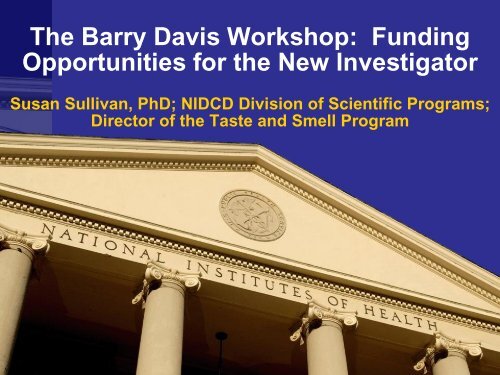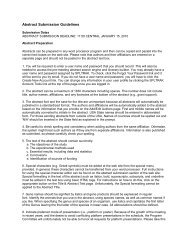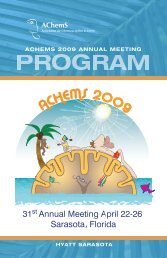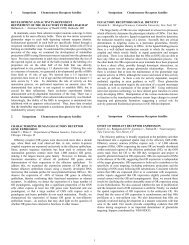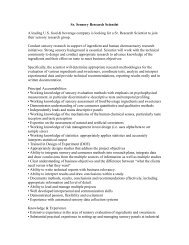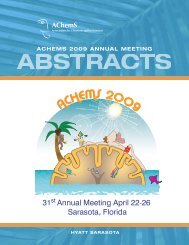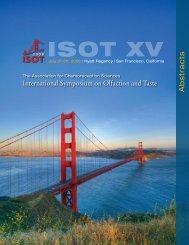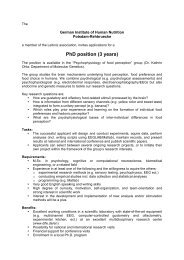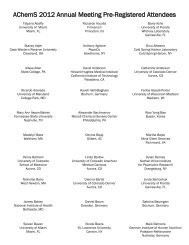The Barry Davis Workshop: Funding Opportunities for the New ...
The Barry Davis Workshop: Funding Opportunities for the New ...
The Barry Davis Workshop: Funding Opportunities for the New ...
You also want an ePaper? Increase the reach of your titles
YUMPU automatically turns print PDFs into web optimized ePapers that Google loves.
<strong>The</strong> <strong>Barry</strong> <strong>Davis</strong> <strong>Workshop</strong>: <strong>Funding</strong><br />
<strong>Opportunities</strong> <strong>for</strong> <strong>the</strong> <strong>New</strong> Investigator<br />
Susan Sullivan, PhD; NIDCD Division of Scientific Programs;<br />
Director of <strong>the</strong> Taste and Smell Program
Goals of workshop<br />
• NIDCD mission areas<br />
• Research funding mechanisms <strong>for</strong><br />
trainees and Early Stage<br />
Investigators<br />
• NIH review process and potential<br />
pitfalls<br />
• Questions
National Institute on Deafness and<br />
O<strong>the</strong>r Communication Disorders<br />
(NIDCD)<br />
Director: Dr. James Battey<br />
Mission: conduct and support<br />
biomedical and behavioral research<br />
and research training in <strong>the</strong> normal<br />
and disordered processes of:<br />
-Hearing<br />
-Smell<br />
-Voice<br />
-Language<br />
-Balance<br />
-Taste<br />
-Speech
NIDCD Extramural Awards (FY12)<br />
Mission areas<br />
• Hearing 53 %<br />
• Balance 5 %<br />
• Smell 11 %<br />
• Taste 6 %<br />
• Voice 7 %<br />
• Speech 7 %<br />
• Language 11 %
NIDCD Extramural Staff<br />
Program Officer (PO): Scientific mgmt.<br />
Assists applicants in <strong>the</strong> process (advises on NIDCD<br />
mission areas and grant mechanisms), attends<br />
review meetings (advises on resubmission),<br />
recommends funding and post-award actions<br />
Scientific Review Officer (SRO): Review mgmt.<br />
Recruits, schedules, and convenes expert review<br />
committees (study sections), assigns and advises<br />
reviewers, and prepares Summary Statements<br />
Grants Management Officer (GMO): Fiscal mgmt.<br />
Checks budgets and issues Notices of Grant Award<br />
(NGA), no-cost extensions, institutional transfers
Select NIDCD Research and<br />
Training Awards<br />
Individual Ruth L. Kirschstein National<br />
Research Service Awards (NRSAs)<br />
• F30: Integrated dual-degree training (MD/PhD, etc.)<br />
• F31: Predoctoral training (Diversity and “generic”)<br />
• F32: Postdoctoral training<br />
Select Career Development Awards<br />
• K99/R00: Early-Stage Career Transition<br />
Select Research Project Grant Awards<br />
• NIDCD Small Grant R03 Program<br />
• Investigator-initiated R01
Individual NRSA Fellowships (Fs)<br />
• Supports <strong>the</strong> training of predocs or postdocs<br />
• Must be US citizen, US non-citizen national, or<br />
permanent resident<br />
• Limits on <strong>the</strong> total number of years of NRSA<br />
support allowed<br />
• Budgets are pre-determined: stipend, partial<br />
tuition and fees and a small institutional<br />
allowance<br />
• Scientific Review: Review panels convened by<br />
<strong>the</strong> NIDCD Scientific Review Branch<br />
• NIDCD Program Contact: Dr. Dan Sklare
Pathway to Independence Award<br />
(K99/R00)<br />
• Mentored postdoctoral (K99) & independent<br />
investigator (R00) phases<br />
• Up to 5 yrs of support<br />
• Eligibility: Postdocs with < 4 yrs experience;<br />
does not require US citizenship or<br />
permanent residency<br />
• K99 Phase (1-2 yrs): < $105K/yr salary plus<br />
$25K <strong>for</strong> research costs<br />
• R00 Phase (2-3 yrs): < $249K total costs/yr<br />
• NIDCD Program Contact: Dr. Dan Sklare
• NIDCD Program Contacts: Drs. Bracie Watson<br />
and Susan Sullivan<br />
NIDCD Small Grant Program (R03)<br />
• Supports research of PIs who are in <strong>the</strong> early<br />
stages of <strong>the</strong>ir research career<br />
• Eligibility:<br />
– Must be
Investigator-Initiated R01<br />
• Mainstay of NIH research support <strong>for</strong> both<br />
early stage and established PIs<br />
• Up to 5 years in duration<br />
• Modular budgets- direct costs are in $25K<br />
increments up to $250K/yr<br />
• Non-modular budgets- require more detailed<br />
budget justification. Budgets over $499K/yr<br />
require prior approval<br />
• Special considerations given to <strong>New</strong> and<br />
Early Stage Investigators
<strong>New</strong> Investigator (NI) and an Early<br />
Stage Investigator (ESI) Definitions<br />
<strong>New</strong> Investigator (NI):<br />
Not yet held a substantial, competing NIH<br />
research grant (previous F, K, R03, R21 - still<br />
considered a NI)<br />
Early Stage Investigator (ESI):<br />
<strong>New</strong> Investigator within 10 years of completing<br />
his/her terminal research degree or is within 10<br />
years of completing medical residency (or <strong>the</strong><br />
equivalent)<br />
ESI eligibility is determined by <strong>the</strong> degree dates<br />
you report in your Commons account
NI/ESI special considerations<br />
• Discussions of NI/ESI applications are usually<br />
clustered during <strong>the</strong> review meeting to give<br />
appropriate consideration with o<strong>the</strong>rs at <strong>the</strong> same<br />
career stage<br />
• Shorter review cycle with special receipt dates<br />
• If you are an NIDCD ESI and you miss <strong>the</strong> automatic<br />
R01 payline, you may submit a letter to Advisory<br />
Council <strong>for</strong> special consideration <strong>for</strong> funding
Preparing to submit<br />
• Establish an eRA Commons account <strong>for</strong> tracking<br />
<strong>the</strong> progress of your application<br />
– Work with institute officials. Can take weeks.<br />
• Carefully read <strong>the</strong> program announcement <strong>for</strong> your<br />
specific grant mechanism (eligibility, review<br />
criteria, page limits, due dates, and instructions <strong>for</strong><br />
submission)<br />
• Talk with your PO in order to identify <strong>the</strong> most<br />
appropriate institute and study section <strong>for</strong> your<br />
application
What happens to your application<br />
when you submit it?<br />
• Institute signing official electronically submits<br />
your application through Grant.gov<br />
• References must submit letters via eRA<br />
Commons by submission deadline<br />
• Received by <strong>the</strong> Division of Receipt and Referral<br />
• A referral officer refers it to an NIH Institute<br />
• Assigned to an appropriate scientific review<br />
study section<br />
– Training grants and R03s reviewed by NIDCD SRB<br />
– Investigator-initiated R01s reviewed by CSR
Once assigned to study section<br />
Scientific Review Officer (SRO) administers<br />
study section’s review of your application –<br />
• Determines expertise necessary <strong>for</strong><br />
evaluation and identifies appropriate<br />
reviewers<br />
• Provides guidance and review criteria<br />
• Oversees review meeting<br />
• Reports results of review and generates <strong>the</strong><br />
final summary statement
Review of applications<br />
• For each application, generally three reviewers<br />
are designated as “assigned reviewers”<br />
– Assign preliminary overall scores<br />
– Assign criterion scores<br />
– Submit written critiques
Scoring<br />
Impact Score Descriptor<br />
High Impact<br />
Moderate<br />
Impact<br />
Low Impact<br />
1 Exceptional<br />
2 Outstanding<br />
3 Excellent<br />
4 Very Good<br />
5 Good<br />
6 Satisfactory<br />
7 Fair<br />
8 Marginal<br />
9 Poor
Overall Impact Score: 1-9<br />
• Reviewers provide an overall impact<br />
score to reflect <strong>the</strong>ir assessment of <strong>the</strong><br />
likelihood <strong>for</strong> <strong>the</strong> project to exert a<br />
sustained, powerful influence on <strong>the</strong><br />
research field(s) involved.
Scored Review Criteria<br />
Fellowships<br />
• Fellowship Applicant<br />
• Sponsors, Collaborators,<br />
Consultants<br />
• Research Training Plan<br />
• Training Potential<br />
• Institutional Environment and<br />
Commitment to Training<br />
R01s/R03s<br />
• Significance<br />
• Investigators<br />
• Innovation<br />
• Approach<br />
• Environment
Reviewer critique template<br />
Does <strong>the</strong> project address an<br />
important problem or a critical<br />
barrier to progress in <strong>the</strong> field? If<br />
<strong>the</strong> aims of <strong>the</strong> project are<br />
achieved, how will scientific<br />
knowledge, technical capability,<br />
and/or clinical practice be<br />
improved? How will successful<br />
completion of <strong>the</strong> aims change<br />
<strong>the</strong> concepts, methods,<br />
technologies, treatments,<br />
services, or preventative<br />
interventions that drive this field?
Preliminary scores & streamlining<br />
Overall preliminary<br />
score (average of<br />
assigned reviewers)<br />
Discussed<br />
Not<br />
Discussed
“Not Discussed” Designation<br />
• “Not discussed” applications still reviewed<br />
and receive full written feedback and<br />
criterion scores from assigned reviewers.<br />
• One resubmission is allowed---opportunity to<br />
improve application. Reviewers’<br />
concerns addressed in an “Introduction”<br />
page.<br />
• Reference letters (fellowships), appendix<br />
materials, etc… must be resubmitted.<br />
• Take advantage and seek advice of funded<br />
senior investigators!
“Discussed” Applications<br />
• Assigned reviewers discuss strengths and<br />
weaknesses of each application<br />
– Recommend overall impact score<br />
• All eligible panel members record an overall<br />
impact score<br />
• Final overall impact score is <strong>the</strong> average score<br />
of all reviewers multiplied by 10<br />
• Final overall impact scores range from 10-90,<br />
in whole numbers
After study section<br />
• Overall impact score released & appears on<br />
Commons (hours-days)<br />
• Summary Statement released & appears on<br />
Commons (days-weeks)<br />
• Once released, in<strong>for</strong>mation is available to<br />
you and NIH program staff
<strong>Funding</strong> Decision to Award<br />
• <strong>Funding</strong> recommendations (second<br />
level review) made by NIDCD Training<br />
Board (Fs) or Advisory Council (Ks and<br />
Rs)<br />
Prior to an award:<br />
– Resolve any administrative concerns<br />
– Submit just-in-time (JIT) in<strong>for</strong>mation<br />
– Must submit annual progress reports <strong>for</strong><br />
out-year awards
• Typos (!!)<br />
Common weaknesses<br />
• Difficult to read/follow - use<br />
diagrams/drawings <strong>for</strong> complex ideas<br />
• Over- or under-ambitious<br />
• Not enough preliminary data<br />
• Project not well described in context of<br />
current literature<br />
• No consideration of pitfalls and alternatives<br />
• Specific aims are interdependent- avoid <strong>the</strong><br />
domino effect
Common weaknesses<br />
• No letters of support from collaborators/<br />
consultants<br />
• Lack of attention to vertebrate animal or<br />
human subjects sections<br />
• Questions about your independence (R03<br />
and R01s)<br />
• For revised applications: Not responsive<br />
enough to previous reviews- don’t ignore<br />
a comment you don’t like and don’t be<br />
argumentative.<br />
• Submitting be<strong>for</strong>e it is “ready to go”<br />
• Not contacting your Program Officer
Common weaknesses<br />
(Fellowships)<br />
• Applicant: weak grades, poor productivity<br />
• Sponsor/Mentor: unfunded, inexperienced in<br />
proposed techniques, lack of mentoring<br />
experience<br />
• Training plans: not individualized, failure to<br />
include training in what is required <strong>for</strong> <strong>the</strong><br />
project<br />
• Training potential: not clear what will be gained<br />
by training experience, staying at same<br />
institution


